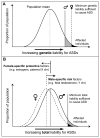Sex differences in autism spectrum disorders
- PMID: 23406909
- PMCID: PMC4164392
- DOI: 10.1097/WCO.0b013e32835ee548
Sex differences in autism spectrum disorders
Abstract
Purpose of review: A strong male bias in autism spectrum disorder (ASD) prevalence has been observed with striking consistency, but no mechanism has yet to definitively account for this sex difference. This review explores the current status of epidemiological, genetic, and neuroendocrinological work addressing ASD prevalence and liability in males and females, so as to frame the major issues necessary to pursue a more complete understanding of the biological basis for sex-differential risk.
Recent findings: Recent studies continue to report a male bias in ASD prevalence, but also suggest that sex differences in phenotypic presentation, including fewer restricted and repetitive behaviors and externalizing behavioral problems in females, may contribute to this bias. Genetic studies demonstrate that females are protected from the effects of heritable and de-novo ASD risk variants, and compelling work suggests that sex chromosomal genes and/or sex hormones, especially testosterone, may modulate the effects of genetic variation on the presentation of an autistic phenotype.
Summary: ASDs affect females less frequently than males, and several sex-differential genetic and hormonal factors may contribute. Future work to determine the mechanisms by which these factors confer risk and protection to males and females is essential.
Figures

References
-
- Whitacre CC. Sex differences in autoimmune disease. Nat Immunol. 2001;2(9):777–80. - PubMed
-
- Szatmari P, Offord DR, Boyle MH. Ontario Child Health Study: prevalence of attention deficit disorder with hyperactivity. J Child Psychol Psychiatry. 1989;30(2):219–30. - PubMed
-
- Barbaresi WJ, Katusic SK, Colligan RC, et al. How common is attention-deficit/hyperactivity disorder? Incidence in a population-based birth cohort in Rochester, Minn. Arch Pediatr Adolesc Med. 2002;156(3):217–24. - PubMed
-
- Viding E, Spinath FM, Price TS, et al. Genetic and environmental influence on language impairment in 4-year-old same-sex and opposite-sex twins. J Child Psychol Psychiatry. 2004;45(2):315–25. - PubMed
-
- Kanner L. Autistic disturbances of affective contact. Nervous Child. 1943;2:217–50. - PubMed
Publication types
MeSH terms
Grants and funding
LinkOut - more resources
Full Text Sources
Other Literature Sources
Research Materials

